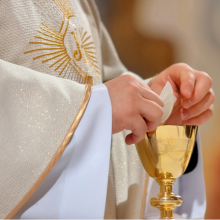Communion
While they were eating, Jesus took a loaf of bread, and after blessing it, he broke it, gave it to the disciples, and said, “Take, eat; this is my body.” Then he took a cup, and after giving thanks, he gave it to them, saying, “Drink from it, all of you; for this is my blood of the covenant, which is poured out for many for the forgiveness of sins.”
— Matthew 26:26-28
CLIMBING ROCK HILLSIDES and wading across gurgling streams lined with thistles, a friend and I walked the Jesus Trail in Galilee a few years ago. After about 8 miles of vigorous hiking each day, the trail led to a hostel or home with a hot meal we shared with other travelers. Our common identification with Jesus on this journey from Nazareth to Capernaum made these bread-breaking events seem to us almost like a “Lord’s Supper”! We were strangers from different countries, but our hunger and our common passion for walking where Jesus walked drew us together.
If eating together helps create a bond between diverse people, what compelled the Apostle Paul to write these words to his house churches in the city of Corinth: “Now in the following instructions I do not commend you, because when you come together, it is not for the better but for the worse.” (1 Corinthians 11:17)?
How does eating a bread cube and drinking a swallow of juice with other church members make things worse in the congregation? What divisions are keeping people apart from each other? Let’s dig into the context.
WHEN I FINISHED reading Kendall Vanderslice’s By Bread Alone, I went into my kitchen and measured out flour, water, yeast, and salt. I kneaded the dough, let it rise and fall then rise again. Soon, three golden loaves were ready for me to bring to my pastor and his family. Bread connects us to each other and to Jesus. As Vanderslice details in her book, bread is central to the Christian story.
Vanderslice, who holds a master’s in gastronomy from Boston University and a master’s in theological studies from Duke Divinity School, is a professional baker and practical theologian. She seeks to create an eternal communion, much like the “taste of bread lingering on our tongues.”
“I don’t think we talk enough about the delight in sexuality, especially spiritually,” Oladokun told Sojourners. They also take inspiration from the spirit of the Last Supper, comparing queer love to communion and noting “there’s something kind of romantic about Jesus at a candle-lit dinner with a bunch of his bros being like, ‘I am this bread. I am this wine. I am what you can feed off of in this moment.’”
An advisory group to U.S. bishops urged the Catholic leaders on Tuesday to avoid making Communion “a tool for division” as debate resurfaces in Catholic circles over whether President Joe Biden’s support for abortion rights should disqualify him from receiving the sacrament.
Gathered in a Baltimore hotel ballroom, the bishops’ conference is scheduled to discuss a draft of a document clarifying the meaning of Holy Communion, a sacrament central to the faith.
The bishops have been divided over how explicitly the document should define the eligibility of prominent Catholics like Biden to receive Communion due to political stances that contradict church teaching.
The two world leaders met behind closed doors to discuss “working together on efforts grounded in human dignity,” with Biden praising the pope’s advocacy in fighting climate change ahead of next week’s United Nations conference on climate change (COP26) in Glasgow, Scotland, according to a White House news release. During their meeting, Biden called the pope “the most significant warrior of peace I’ve ever met,” and gave the pope a “challenge coin” with the U.S. seal on the front. The president also made several jokes, about the two men’s ages, his own sobriety, and said it was “good to be back,” as he was greeted at the Vatican.
ON A RECENT Sunday, my pastors asked the congregation to show up for Zoom church with “something to consume during communion.” And let me tell you, if you’ve never had a tortilla chip as the bread and chipotle salsa as the wine then you might be experiencing a lower tier of consecration. Even my dog—who not only considers the lilies, but also pees upon them—ate from the crumbs of my Tostitos and knew something beautiful and mysterious had transpired.
In other words, Zoom church, even with its lag time and pixilation, has had its perks—but one perk, specifically, above all other perks: While the absence of commutes and underwire bras has been noteworthy, the absence of churchy small talk has been paramount.
My trifles with the Passing of the Peace predate and rival my newer fears of the Passing of the Germs. At the age of 8, I had what my therapist called “separation anxiety” and what my older sister called “OHMYGOD Loosen Your Grip on My Forearm, JENNA.” I did not know what to say if the kind, adult Presbyterians asked me, “How’s school?” or the even more terrifyingly open-ended: “How’ve you been?”
Cardinal Wilton D. Gregory of Washington, D.C., has said that he would not deny Biden Communion; Rev. C. Kevin Gillespie, pastor of Biden’s home parish in Washington, Holy Trinity Catholic Church, agreed with that decision.
“Walking together” is one of the pope’s favorite mantras. When dealing with tense theological debates inside the church, he is putting equal weight on both words.
The idea for an Election Day church service came to the pastor as he was pouring juice into little plastic cups.
Mark Schloneger was preparing for Communion that day in 2008, in the kitchen of Waynesboro Mennonite Church in Virginia’s Shenandoah Valley. The phone rang. It was a robocall from Sarah Palin, the GOP’s vice presidential nominee that year. She was imploring Christians to go to the polls, vote for her party, and take back the country.
I pretend to be a hermit. I’m shy and always have been. I’m introverted, too, which isn’t the same thing; being with others, especially in large groups, simply saps my energy.
But in my heart, I want to be the pilgrim. One obstacle: Despite the Bible’s repeated admonitions not to be afraid, I am. Yes, I fear disappointing God. But — true confession — my greater fear on this trip, and a sign, no doubt, of my mixed-up priorities, was that I might somehow be deemed unworthy, unwanted, by my fellow pilgrims.

Tom Molina-Duarte and Bryan Victor. Image via Eric Seals / Detroit Free Press / RNS
Because their Catholic faith is against same-sex marriage, Bryan Victor and Thomas Molina-Duarte made their wedding vows this summer before a Protestant minister in a Detroit Episcopal church.
Those in attendance included many family members, including Victor’s uncle, who is a Catholic priest and Macomb County pastor. The Rev. Ronald Victor did not officiate but was there because, he told his nephew, the Catholic Church “needs more examples of gay holiness.”
When Victor and Molina-Duarte attend Mass every Sunday, the couple go to a Detroit Catholic church, where Bryan Victor’s mom and dad join them in the pew. In their shared Catholic faith, Victor and Molina-Duarte find spiritual sustenance. And at their parish, they’ve also found acceptance.

Image via Claudia Daut / REUTERS / RNS
Pope Francis has a knack for setting traditionalist teeth on edge with unscripted musings on sacred topics. He recently did it again when he seemed to suggest that a Lutheran could receive Communion in the Catholic Church after consulting her conscience.
The exchange came up during a prayer service Nov. 15 at a Lutheran church in Rome that had invited the pontiff. And he used the occasion to engage in a question-and-answer session with some of the congregants.
One woman, Anke de Bernardinis, told Francis that she was married to a Catholic and that she and her husband share many “joys and sorrows” in life, but not Communion at church.
“What can we do on this point to finally attain Communion?” she asked.

Holy Eucharist, Thoom / Shutterstock.com
I’ve thought about this obedience to vulnerability in light of the current conversation our nation has been having about the refugee crisis, in particular since the attacks in Paris this weekend. The fearful calls to close our border have been disheartening, especially as we begin to enter the season of Advent. Jesus, as God incarnate, saw our sin and flaws and darkness — our hostility even — to the Light and still made himself vulnerable to live among us and die at our hand. Through the cross he offered a generous hospitality to us while we were still enemies of God — a feast of himself, for us to taste and see that God is good.
It should not be any different for us as followers of Christ. As any Christian knows, being part of the Body of Christ is often a dangerous proposition. We are in danger of getting hurt any time we come into contact with another person. We will sin against each other, we will experience conflict, and if we’re doing it right, we’ll bear each other’s suffering. We are knit together with people we may not typically associate, people who view the world in ways we may find misguided at best and dangerous at worst. It doesn’t matter — we’re still invited to the same feast and we’re still joined together in the same family, drinking out of the same cup the way family members and close friends do.

Pope Francis. Photo via Philip Chidell / Shutterstock.com
Speaking out on one of the most contentious issues of his papacy, Pope Francis on Aug. 5 issued a powerful call for the church to embrace Catholics who have divorced and remarried, telling a gathering at the Vatican that such couples “are not excommunicated, and they absolutely must not be treated that way!”
“The church is called to be always the open house of the Father … no closed doors! No closed doors!” Francis told the crowd at his weekly public audience, which resumed after a month-long summer break.
[W]hen I was in junior high, I decided I wanted to become the first black woman ordained in the Lutheran Church. ... At Wesley I enjoyed being a student again, until one of the black seminarians asked, “How can you be black and be Lutheran?” I didn’t know. I had never thought about it. The Lutheran Church is predominantly white, ethnically German and Scandinavian. It is highly structured and without the display of lively emotions most blacks are used to in their religious experiences. The Lutheran Church was the only church I had ever really known, and yet suddenly I was thrust into an identity crisis that really rocked me.
I stood at the bread shelf in the neighborhood grocery store, trying to decide which loaf I should buy. Tough decision. I looked at all the types of bread and went back and forth many times.
Which one would be best for communion? I didn’t know. I’d never had to make this choice.
Our pastor was at a conference for the weekend. As the associate minister, I would be presiding over the Sunday service for the first time. Before he left, we went over the details of all that had to be prepared.
He reminded me that I needed to buy the bread for communion.
Uh, I hadn’t thought about that. Where do you get it?
“The grocery store will do just fine.”
So there I was, looking over the loaves, wondering which one looked the most, well, communion-y. Maybe that pretty, round Tuscan loaf. Wait, maybe the nice Jewish rye over there. My wry sense of humor kicked in. Jesus would smile over that, right? Being Jewish and all.
No, better not …
I finally picked an Italian loaf — mainly because it was big and it looked pretty and it was on sale. I put it in my basket and headed for the self-checkout line.
When I scanned the loaf, the automated voice asked: “Do you have any coupons?” No, no communion coupons. Not today.
I swiped my credit card and was reminded that my purchase would earn me a few cents off my next gasoline purchase. How’s that for transubstantiation — bread transformed into bonus points?
Pope Francis raised the prospect of no-cost marriage annulments on Nov. 5 after revealing he had dismissed a church official for selling annulments for thousands of dollars, which he called a “public scandal.”
The pontiff made the shocking disclosure as he was addressing canon lawyers at the Vatican for a course on marriage dissolution conducted by the Roman Rota, the church’s highest court.
“We have to be careful that the procedure does not become some kind of business,” the pope said. “There have been public scandals.”
“I had to dismiss a person from a tribunal some time ago who said: ‘Give me $10,000 and I’ll take care of both the civil and ecclesiastical procedures.’ Please, not this!”
Francis did not provide any more details about where or when the sacking occurred. He stressed the need for the church’s annulment procedures to be easier, faster and cheaper. He even suggested fees could be waived.
“When you attach economic interests to spiritual interests, it is not about God,” he said.
One of the greatest sermons I ever heard on the subject of communion was offered by the head pastor of a Christian Missionary Alliance church in Princeton, N.J., back in the late 1980s. This pastor spent most of that sermon talking about the cross and how Jesus’ body was literally broken. I can still hear the crunch of the nails going into Jesus’ wrists that I heard in my mind’s ear that Sunday. And this wasn’t Easter week. It was just a communion Sunday.
Toward the end of his sermon, the pastor brought out a piece of saltine cracker that lay in the communion plate. He cracked it and then he said this: “Every time I take communion I hear the crack of the bread in my mouth and I bite and remember the crack of Jesus’ bones … and I remember that I did that.”
I wept as we took communion that day.
But isn’t that really about dis-union — the dis-union of Christ’s actual physical body? The cracking of his bones, the breaking of his legs, the piercing of his flesh; the cross seems to be more about a breaking apart than a bringing together of Christ’s body.
Right now when I see the lived reality of the church in our world, it seems we are more in a state of dis-union than communion.
A midpoint report from this month’s Synod of Bishops reveals that Catholic leaders are considering more conciliatory language toward gays and lesbians, divorced and remarried Catholics, and couples who live together before getting married.
Meeting with nearly 200 senior prelates and several dozen lay experts and observers at the Vatican, Pope Francis has deliberately engineered a lively discussion of issues concerning marriage and family life. This assembly, and a follow-up summit in 2015, will help shape the pontiff’s legacy.
Reporters and commentators are producing a flurry of analysis mostly centered on the question of whether the synod portends a change in substance or merely a change in tone. Such is the abiding question of Francis’ papacy.
Yet through these lively debates in Catholic life runs a theme that is as old as the Reformation: the role of individual conscience.
The world’s Catholic bishops on Oct. 13 signaled a move toward greater tolerance of gays and lesbians, an about-face so unexpected that leaders of the church’s right wing called it a “betrayal.”
Noting that gays and lesbians have “gifts and qualities” to offer the church, the mid-point assessment reflected the impact that Pope Francis seems to be having on the two-week Synod on the Family as he pushes for a more open, less doctrinaire approach.
“Are we capable of welcoming these people, guaranteeing them a fraternal space in our communities?” said the communique from the nearly 200 bishops and lay delegates. “Often they wish to encounter a church that offers them a welcoming home.
“Are our communities capable of providing that, accepting and valuing their sexual orientation, without compromising Catholic doctrine on the family and matrimony?”















